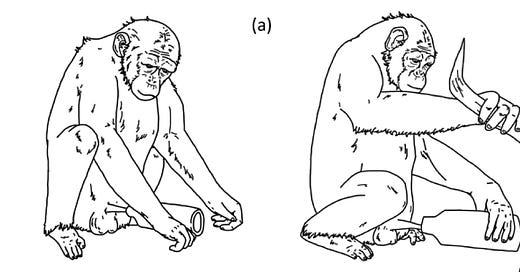EXCLUSIVE: Natal Conference Speech: "Chimp in State of Nature"
Exclusive for paid subscribers, my speech at this year's Natal Conference in Austin, Texas
“Chimp in state of nature never jerks off, but in captivity he does, wat does this mean?”
What indeed. I’ll come back to this important question in just a moment.
At last year’s Natal Conference I spoke about endocrine disruptors and, in particular, how these novel industrial chemicals are wreaking havoc with our hormonal systems and making us less fertile, as well as many other things—fatter, more depressed, more cancer-ridden, stupider. I could continue. These chemicals, which are absolutely everywhere, may even make it physically impossible, as early as 2045, to reproduce by natural means at all, sperm counts are plummeting so fast. This is the so-called “spermageddon” you may have heard mention of. It’s a prediction based solely on extrapolation of existing trends, which new research suggests are accelerating.
Every human society faces some kind of reproductive problem or problems, and the form of that problem or problems is determined by the particular form of the society itself. We’ve created a world of plastics, herbicides, deodorants and hormonal birth control, so it’s toxic chemicals we have to contend with. Ancient nomadic societies like the Scythians, by contrast, faced reproductive problems as a result of their hard horseback lifestyle, problems we see mirrored today among keen cyclists and men who wear skinny jeans and tight underpants. No joke.
One year on from my speech, I still believe endocrine disruptors and unhealthy lifestyles more broadly are making it harder and harder for people today to have kids. I mean this not only in the brute biological sense, but also in the sense that these things make us fatter, less attractive, less motivated, more anxious and depressed—none of which, I think you’ll agree, is conducive to finding a decent mate and having children.
But increasingly I think there’s something else at work that doesn’t get enough attention, an ethical or even a spiritual crisis at the heart of life today that means people simply don’t want to reproduce.
I’m going to talk about this in quite an impressionistic manner, because it’s a slippery thing. I’m not sure, given what we know or think we know, that we can be totally precise about it, at least not yet. But I am sure that it’s real.
We can’t just “attend to material conditions” and expect people to start reproducing again, just like that. There is no better example of this, for all Viktor Orban’s efforts, than Hungary. Orban became the poster boy of pro-natalism throughout the Western world for his tax incentives for young couples and interest-free loans, and yet they appear to have amounted to nothing. Hungary has seen a very modest bounce in birth rates, but the country still has a very low birth rate, among the lowest on the Continent and still well below replacement. Hungary was one of the European countries worst affected by the Financial Crisis of 2008, so it’s not even clear whether the recovery in birth rates is due to Orban’s pro-natal measures or to the broader economic recovery.
Should we be surprised?
I don’t think we should. Back in the first century, the Roman emperor Augustus tried exactly the same thing with his leges Iuliae, and they didn’t work either. He offered various incentives to promote motherhood and discourage men and women from being unmarried. A hundred years later, the Roman historian Tacitus would complain of exactly the same things Augustus had sought to remedy. Looking north, across the Rhine to the ancient Germans, Tacitus could say, bitterly, that there, at least, “childlessness has no rewards.”
Only constant population churn from the provinces allowed the centre of the Roman empire to hold—until it didn’t. Rome’s ever-growing reliance on foreign mercenaries was, ultimately, her undoing.
*
Bronze Age Pervert, in his exhortation Bronze Age Mindset, formulates the reproduction problem in an interesting way. Here’s what he says, in aphorism 16.
Chimp in state of nature never jerks off, but in captivity he does, wat does this mean? In state of nature he’s too busy, to put plainly. He is concerned with mastering space: solving problem of life in and under trees, mastering what tools he can, mastering social relations in the jockeying for power and status. Deprived of this drive to development and self-increase he devolves to pointless masturbation, in captivity, where he senses he is in owned space and therefore the futility of all his efforts and all his actions. The onanism of modern society is connected with its supposed “hyper-sexualization” and its infertility. It’s not really hyper-sexualization, but the devolution of the spirit to the lassitude of a diffuse and weak sexuality.
Keep reading with a 7-day free trial
Subscribe to In the Raw to keep reading this post and get 7 days of free access to the full post archives.





